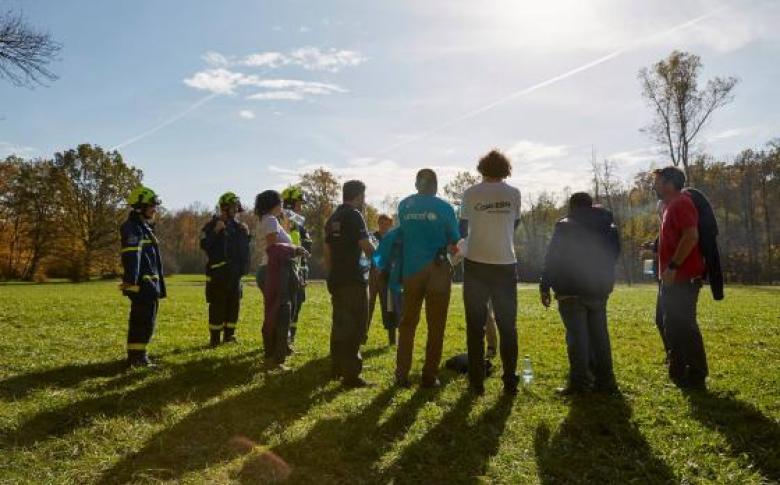Guest Article: ‘It is 24-7, go-go-go’ - Logistics Cluster and ETC come together for the 2018 gear.UP training

It’s 1.30am, and more than 40 responders from the humanitarian community sit to discuss the latest operational update. They’ve each had just 10 hours sleep over a 72-hour period – in a tent. It’s cold. Stress levels are high, lack of sleep is taking its toll, and it’ll be at least another 90 minutes before bedtime is an option. They’re three days in to a seven-day emotional rollercoaster.
For humanitarians across the world, this scene is strikingly similar to that of a sudden onset emergency. But these people are not responding to a real-life crisis, they’re in the midst of one of the largest scale humanitarian preparedness and response simulations.
Next week, more than 200 participants and facilitators from 35 organisations will once again descend upon Neuhausen in Germany for gear.UP: an intense and arduous week-long event, led jointly by the Logistics Cluster and the Emergency Telecommunications Cluster (ETC).
It’s the second year in a row the two WFP-led clusters have teamed up for the simulation, which is centred on reinforcing coordination and offering participants the opportunity to learn from each other in as near-field conditions as possible. To mark the event, we caught up with a few of last year’s participants on how they found the simulation, the biggest challenges, and what advice they’d give to this year’s participants.
What are your reflections from last year’s event?
“The most important part was how real it all felt."
It was a super intense environment, and in many instances the pressure was higher than emergencies I’d worked on previously. When things got super tough, everyone picked up tasks outside their expertise, to ensure the job got done. Team dynamics were very strong,” Julie Vanderwiel, WFP.
“Fantastic! The main reason? I felt it was as close to a real-life emergency as possible, working with people from different organisations and different sectors. I was also able to gain a lot of technical knowledge that I didn’t have previously. As a logistician, being part of a joint event with ETC meant I learned a lot more about how communications work, how to deal with the set-up and the type of support ETC provides to the humanitarian community. I definitely felt ready to be deployed for Logistics Cluster or any other organisations,” Pieter Bakker, Tearfund.
What are the benefits of joint-cluster capacity building initiatives?
“Training side-by-side in a joint-cluster setting is a great opportunity to get closer to the reality on the ground. The ETC and Logistics Cluster are often referred as “services clusters,” supporting humanitarians in carrying out their life-saving operations. Both clusters work very closely together in every operation as they need each other to operate well. It also offers more opportunities for us to interact with actual organisations that use our services, supporting their operational needs, which adds to the realism of the simulation. Overall, being able to practice together in a simulation builds working relationships, which makes a huge difference when the time comes to actually deploy to the next emergency,” Caroline Teyssier, ETC.
What advice would you give to participants this year?
Get stuck into it. Jumping in and giving it your all is the most beneficial way to approach this. It is 24/7, go-go-go. Remember it is supposed to be a learning experience, so if you have the opportunity to lead a group or join a meeting, go for it. Don’t be afraid of making mistakes. The amount of information that facilitators throw at you is immense, and it is intended to put you under enormous pressure. Everyone makes mistakes, but that’s what makes it’s such a great learning environment,” Graham Woodcock, Concern International.
This joint-cluster initiative is being generously hosted by THW, co-funded by the German Federal Foreign Office and the Government of Luxembourg and supported by Ericsson. The event is organised by the Logistics Cluster, ETC, Emergency.LU and THW.
Read more about Logistics Cluster and ETC trainings.